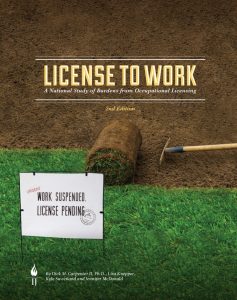Cut red tape and streamline requirements for starting a business
Cities should cut red tape to make it cheaper, faster, and simpler to get a business off the ground.
To start the businesses of their dreams, entrepreneurs must navigate a maze of requirements—paperwork, fees, registrations, and permits—to prepare for opening day. Now more than ever, entrepreneurs need to be able to start small businesses quickly and affordably, with the flexibility to change their business models in an ever-shifting world.

But too often, red tape stifles would-be entrepreneurs who are high on dreams but low on capital. Costly fees and in-person trips to agencies consume time and resources, while redundant paperwork and complex licensing and zoning rules make it difficult for some to know where to start.
How does red tape affect entrepreneurs?
IJ has spoken to hundreds of entrepreneurs across the country about their experiences getting started. Here are their three major complaints about red tape:
- Poor or incomplete guides online force residents to go back-and-forth between agencies, breeding uncertainty and frustration.
- Thousands of dollars in start-up fees for permits and licenses, which typically must be paid before the business makes a dime, put entrepreneurship out of reach for many.
- It often takes dozens of steps to complete the licensing and permitting process from start to finish.
But it doesn’t have to be this way. Cities can look across the country for examples of how to make it cheaper, faster, and simpler to start a business.
How can your city ease the cost and complexity of starting a business?
By removing obstacles to entrepreneurship, cities can spur economic recovery and job creation for their community’s most vulnerable residents.
Five real-world steps your city can take to streamline the process of starting and running a business:

Cities have taken swift action to help their communities adjust to the changing public health environment and found creative ways to provide relief to businesses during this challenging time. Granting businesses the flexibility to keep adapting to an ever-changing environment will allow them to keep their doors open and keep people employed while addressing the needs of their communities.

Starting a business is already an uncertain, risky endeavor, but local governments often add to the uncertainty with complex rules that lack transparency and confuse would-be business owners. With a simpler process to start a business, cities can drive their own recoveries from the ground up. Municipalities should streamline rules for getting a business off the ground by creating a one-stop shop, being transparent about wait times and requirements, and streamlining visits to agencies.

Business owners typically need permission from several city departments before they reach opening day, and each interaction comes with its own set of costs. Even lower-impact business models, like non-food retail stores or temporary pop-ups, must often pay several hundreds of dollars in fees for general license requirements. Cities should lower fees for new and small business owners. In a time of economic uncertainty, encouraging new business creation and easing the burden on existing business is key to ensuring a swift recovery in the years to come.

Many cities rely on outdated technologies and processes that require business owners to complete some paperwork in person. To save staff time and keep residents safe, cities should create a one-stop shop for business owners to complete paperwork, build user-friendly checklists, and remove in-person requirements. In a time when in-person interactions need to be limited, moving as many services online as possible makes sense for the short-term and the long-term future for city departments and services.

Remove debt-imposed barriers to entry.
Cities should support entrepreneurs in all income brackets by reforming rules that require entrepreneurs certify that they do not owe debts to the government before they can start a business. This means eliminating fines and fees that trap entrepreneurs in a cycle of debt and ending requirements that prevent entrepreneurs from obtaining a business license if they have unrelated, minor unpaid fines and fees. The last thing an entrepreneur needs during these times is another roadblock to building their business and supporting themselves and their family.
 City leaders can be a force for entrepreneurs by removing regulatory obstacles, and IJ can help. We work alongside city officials to:
City leaders can be a force for entrepreneurs by removing regulatory obstacles, and IJ can help. We work alongside city officials to:
- Research requirements: We research what it takes to start a business in cities, including all of the steps and costs. We can also share best practices for how other cities dealt with similar policy issues.
- Conduct surveys: We host roundtables and compile feedback from entrepreneurs with first-hand experience navigating the licensing process.
- Advocate: We work with agencies and councilmembers to enact regulatory and legislative changes that truly make a difference for entrepreneurs
Read IJ’s work on the burdens and costs created by excessive occupational licensing.
Let’s get to work in your city.
Please fill out this form and an IJ staff member will reach out to you shortly.


